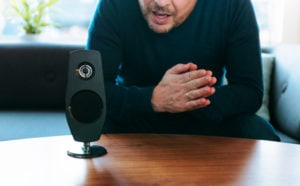[x_section style=”margin: 0px -45px -25px -45px; padding: 45px 0px 0px 0px; “][x_row inner_container=”true” marginless_columns=”false” bg_color=”” style=”margin: 0px auto 0px auto; padding: 0px 0px 0px 0px; “][x_column bg_color=”” type=”1/1″ style=”padding: 0px 0px 0px 0px; “][x_text] Voice-activated assistants such as Amazon Echo and Google Home are increasingly popular – and can be a fun and useful tool at home or in the office – but like most internet-connected technologies, they aren’t without security risks.
Voice-activated assistants such as Amazon Echo and Google Home are increasingly popular – and can be a fun and useful tool at home or in the office – but like most internet-connected technologies, they aren’t without security risks.
One of the primary security concerns surrounding smart devices is their ability to “listen.” Did you know that once your voice assistant is “awake” it records everything that is said while it is activated and then sends these recordings to backend servers using encrypted messaging?
And while there haven’t been any documented cases of large-scale hacking events targeting these voice assistants (yet), other IoT devices have experienced significant security breaches. Just a quick review of Mirai and Hajime malware shows how quickly smart home devices can be used by hackers to carry out remote attacks.
As with all online activity, 100% privacy is probably an unrealistic standard, but there are a number of actions users can take to minimize voice assistant security issues.
- If you don’t plan to use your device for an extended period of time, mute it. Although the functionality of voice-activated assistants only works if they’re able to listen, if you’re leaving the office for the weekend or going to be away from home, it’s probably best to mute the device, which manually turns off the “always listening” microphone until you switch it back on.
- Don’t store sensitive information on smart devices without requiring two-factor And as a general rule, limit the amount of banking, credit card, or password information your voice-activated assistant has access to – it’s only convenient until your account falls into the wrong hands. And even if the capability exists, never link home or office security systems or smart door locking systems to your voice assistant (that is only asking for trouble).
- Erase old recordings and tighten up data collection settings. Like we mentioned above, the default setting for voice assistants such as Amazon Echo and Google Home is to store all recordings made while your device is active, but you do have the power to limit what information is stored and how long it’s stored. You just need to go in and manually update your account settings in your Amazon and/or Google account.
Still have questions about Google Home or Amazon Echo security? The team at ATB is here to help. We invite you to schedule a complimentary consultation to learn more about our array of security services that can help ensure your smart devices are best protected from hackers and cyber-attacks now and in the future.[/x_text][x_prompt type=”left” title=”Call Us Today” message=”Give us a call: 314-878-4166″ button_text=”Contact Us Online” button_icon=”comment” circle=”false” href=”/contact/” href_title=”” target=””][/x_column][/x_row][/x_section]
